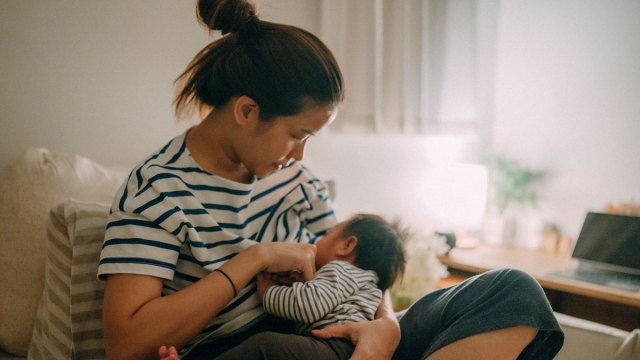The American Academy of Pediatrics issued a policy statement Monday extending its recommendation for breastfeeding to two years or more. While the organization did note that it understands that until society catches up to support this actually happening (which feels like an odd statement given the current news), breastfeeding for this length of time is challenging.
“We need societal changes that will help to support this, such as paid leave, more support for breastfeeding in public and child care facilities and workplace support, according to Dr. Joan Meek, a professor emeritus at the Florida State University College of Medicine and lead policy author.
In an updated policy statement AAP recommends exclusive breastfeeding of infants for the first six mos. of life, while encouraging social & systemic changes to support mothers who choose to breastfeed. Read more: https://t.co/hQ31TShk9c
— American Academy of Pediatrics (@AmerAcadPeds) June 27, 2022
The goal, it said, was for pediatricians to have “nonjudgmental conversations” with families about the recommendation, but that’s not an easy balance when it comes to something as personal and often impossible as this. Paid leave, flexible work schedules, lactation rooms, mental health support, and childcare are often overlooked entirely or are subpar at best in many workplaces.
That, compounded by the pressure and guilt many women feel to continue to breastfeed (or breastfeed at all) makes this recommendation feel even heavier. Conversely, many of those that have breastfed for two years and beyond feel judged by a society that collectively rolls their eyes at women who dare to breastfeed a toddler in public—or anywhere for that matter.
Meek cited research that shows health benefits of extended breastfeeding, like decreased risk for maternal Type 2 diabetes and for babies, a lower risk of respiratory tract infections and ear infections. The AAP’s new policy statement coincides with the recommendations of the World Health Organization, which endorses breastfeeding up to a child’s second birthday or longer.
“Breast milk is unique in its nutrients and protective effects, and really quite remarkable when you look at what it does for a child’s developing immune system. Not everyone can breastfeed or continue breastfeeding for as long as desired for various reasons, including workplace barriers,” Meek acknowledged. “Families deserve nonjudgmental support, information and help to guide them in feeding their infant.”











